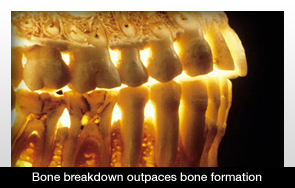 |
Since the 1990s, a class of drugs called bisphosphonates has been used to prevent the loss of bone mass—also known as osteoporosis. Although these drugs do a miraculous job of slowing one’s natural bone deterioration, they are associated with an undesirable side effect related to the teeth and jawbone.
Bone, like the rest of the body, undergoes constant turnover—much like our hair or skin. As we grow older, the process of bone breakdown outpaces bone formation, causing our bones to become more porous and fragile and prone to breakage.
The role of bisphosphonates is to slow down the process of bone breakdown. The most common brand-name drugs used for these conditions are: Fosamax, Bonivia, Bonefos, Aredia, Acronel, Actonel, Zometa, Aclasta, Didronel, Skelid, and Loron.
Since their introduction, these medications have helped prevent many fractures, hip replacements and undue hospitalizations. However, side effects of these drugs include loose teeth and/or gum infection, and a condition known as osteonecrosis of the jaw (ONJ), which is bone exposure in the mouth.
Contributing factors to ONJ are alcohol abuse, smoking, poor nutrition, poor oral hygiene, infection, chemotherapy, hormonal treatments, anemia and previous organ transplants.
The exposed area, normally in the lower jaw, is usually painful, gets infected, and heals very slowly. Patients with ONJ may experience complications when undergoing dental surgery or radiation therapy.
Currently, there are no effective treatments for ONJ.
The best way to prevent such an occurrence is prevention itself.
Prior to starting any bisphosphonates therapy, it is best to visit your dentist and have a thorough dental examination and x-rays. Discuss with your dentist that your physician has recommended the use of bisphosphonates.
During the dental visit, all teeth and gum tissues should be examined and tested. A diagnosis of your gum condition should be discussed and appropriate treatment recommended.
It is highly recommended that all dental treatment be addressed and completed and your dentist should give you a clean bill of dental health prior to starting the bisphosphonate therapy. This way, the unwanted side effects of bisphosphonates can be avoided and you also enjoy having a beautiful and healthy smile.
 |











